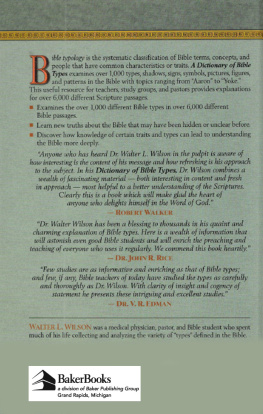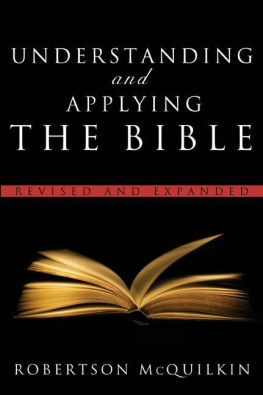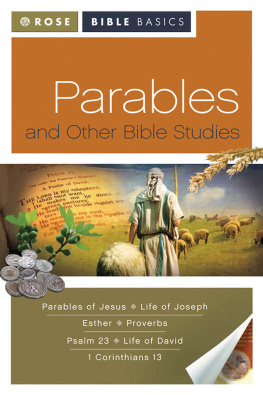1
Bible Study Is for Everyone
The scene before our eyes is the vast expanse of wilderness between Jerusalem and the Jordan River. In preparation for His public ministry, Jesus had fasted 40 days and nights in this barren expanse, alone, hungry, and weary. Satan now confronts Him with three insidious temptations. Three times our Lord wards off his suggestions by quoting from the Book of Deuteronomy.
Recognizing that the Bible is authoritative for the Savior, Satan tries his hand at quoting Scripture too. He selects the psalmists statement, For he will command his angels concerning you to guard you in all your ways; they will lift you up in their hands, so that you will not strike your foot against a stone (Psalm 91:11-12; see Matthew 4:6).
As you compare Satans words with the text in Psalm 91, it is interesting to note that he does not misquote the psalmist. Rather, he misuses the passage by misrepresenting the intent of the writer.
The tactics of our enemy have not changed through the centuries. Since Satan misrepresented the Scriptures to Jesus Christ, the believer today can be assured of the same thing happening to him. But how does the devil do this? From what quarter are we to expect his attacks?
Ways in Which the Bible May Be Misused
Five ways immediately come to mind, and others could be added to this illustrative list.
1. The Scriptures may be misused when you are ignorant about what the Bible says on a given subject.
The ordination of avowed, practicing homosexuals into the gospel ministry is an example. Some would have the church believe that the loving, accepting spirit of our Lord Jesus precludes their being barred from ordination. Nowhere did Jesus say they shouldnt be ordained, so the church should ordain them as clergy in good and regular standing. Yet the Old Testament expressly forbids acts of homosexuality (see Leviticus 18:22), and Paul states that homosexual behavior contributes to Gods wrath on mankind (see Romans 1:26-27). Ignorance about what the Bible teaches is an open door to the attack of the enemy.
2. The Scriptures may be misused when you take a verse out of context.
On the night of His betrayal Jesus said to His disciples, Until now you have not asked for anything in my name. Ask and you will receive, and your joy will be complete (John 16:24). Some have taken this to be a carte blanche promise from God. He will grant whatever you ask. That same night, however, a short while after making this statement, Jesus prayed in the Garden of Gethsemane, Take this cup from me. Yet not what I will, but what you will (Mark 14:36). Promises in the Bible must be blended with the total context of the scriptural teaching on prayer (see 1 John 5:14-15).
3. The Scriptures may be misused when you read into a passage and have it say what it doesnt say.
Toward the end of His ministry, Jesus said, And these signs will accompany those who believe: In my name they will drive out demons; they will speak in new tongues; they will pick up snakes with their hands; and when they drink deadly poison, it will not hurt them at all (Mark 16:17-18). Some have taken this descriptive passage to be a command to do all of the things mentioned, reading into it a mandate to do all of these when all Jesus is doing is describing what is going to happen in situations in the early church when certain people had the gift of miracles.
4. The Scriptures may be misused when you give undue emphasis to less important things.
Did Judas, the betrayer of our Lord, participate with Jesus and the other disciples in the Last Supper? The evidence is inconclusive, yet some allow themselves to become greatly exercised over an issue such as this, even to the point of contributing toward disunity in the church.
5. The Scriptures may be misused whenever you use the Bible to try to get God to do what you want, rather than what God wants done.
Let us use the example of a woman who is in love with a man and wants very much to marry him. Jesus said, Again, I tell you that if two of you on earth agree about anything you ask for, it will be done for you by my Father in heaven (Matthew 18:19). Taking this promise to a girlfriend, she asks the woman to join her in claiming this promise in order to get the man. This is an obvious misuse of the Scriptures.
The Need for Bible Study Methods
Not every misuse of the Bible can be attributed to an attack from Satan, even in the illustrations just mentioned. It becomes immediately apparent, however, that you must learn to use the Scriptures carefully. Christians must not only become familiar with the rules of interpretation, but they must apply these rules to a life-long habit of Bible study. The objective of this section of the book is to introduce you to Bible study methods. Much good material is already available on this subject, but the intent here is to take some methods of Bible study and make them simple enough for the average layman to incorporate into his Christian life.
Unlike the subject of interpretation, Bible study methods have a great deal of flexibility and require some creativity. These methods are not rules of Bible study per se, but are guidelines which, if followed, will enhance the study of the Scriptures. We will explore these methods in the following chapters. No matter how masterful or conscientious a student of the Bible you may be, you must maintain vigilance in staying fresh and creative. So experiment with the various methods. Pick and choose from what is offered and add your own ideas. Make the method yours. Remember, there is a difference between doing Bible study which can be drab and perfunctory on the one hand, and studying the Bible which is exciting and life-changing on the other.













